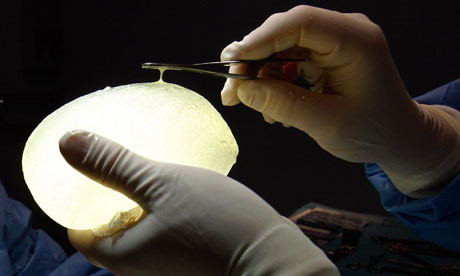
The scare over breast implants made by French firm Poly Implant Prothèse is hardly surprising; there have been scandals about leaking implants before, and many anecdotal reports linking implants with long-term health problems. But it is impossible to know what the long-term consequences might be with any accuracy when most are fitted by private clinics with no interest in long-term follow-up.
The Medicines and Healthcare products Regulatory Agency is the government agency responsible for ensuring that medicines and medical devices work and are acceptably safe. It is an executive agency of the Department of Health and is currently advising that there is no evidence of an increased risk of rupture or cancer. But it is more difficult to make such links without a national register, and difficult to trace women potentially at risk if any type of implant is found to be faulty. This is even more complicated if the clinic or manufacturer becomes insolvent, and the news that private data from some clinics has revealed rupture rates of about 7% highlights the inadequacy of reporting to the MHRA.
The French government has agreed to remove all PIP implants as the risk of rupture among women in France is reported to be about 3.6%. Some have called for the DoH to agree likewise for British women concerned about the risks or reporting side-effects. If, as a result of further evidence from private clinics, the advice on removal is changed, should the NHS pick up the bill or should it be met by the industry that is so keen to take the money in the first place?
It is in all our interests that the NHS continues to take a non-judgmental approach. Who would want an NHS that declined treatment to people who take unnecessary risks; where would we draw the line about treating hang-gliders or skiers, or even refusing free treatment to smokers? But perhaps in future women who wish to undergo cosmetic breast enlargement should have to pay an additional premium to cover the costs of removal in the event that they regret their decision or the implants fail; it could also cover the cost of maintaining a national register.
"The British Association of Plastic, Reconstructive and Aesthetic Surgeons and the British Association of Aesthetic Plastic Surgeons have spoken out about the use of PIP breast implants and reiterated the importance of both clinics and patients putting safety first when they choose to undergo cosmetic procedures." So reads the statement on the BAPRAS website, but are there any circumstances when fitting cosmetic breast implants could ever enhance the safety of patients?
Perhaps women damaged by complications from breast implants should take their cases to the General Medical Council and ask them to consider how those surgeons mutilating them to look like grotesque dolls could in any way have put their safety first. It strikes me that this industry both promotes and normalises a dysmorphic and damaging stereotype.
Of course no one is forced to undergo cosmetic surgery, and it may well be safer to have treatment in the UK than in a cheap dodgy clinic abroad. But, other than following disfiguring treatment for conditions such as cancer, how does it ever improve a woman's health to have cosmetic implants? Anyone considering it should read the long history of failed implants and take a look at the photos of how they will look if they need them removed, or if things go wrong.
It is time for those who profit from this industry to take greater responsibility for its consequences for individuals and for women in general. Surgeons, like all doctors, should put the best interests of their patients first. And if it emerges that private clinics have been withholding data showing harm, then the GMC must take action.

